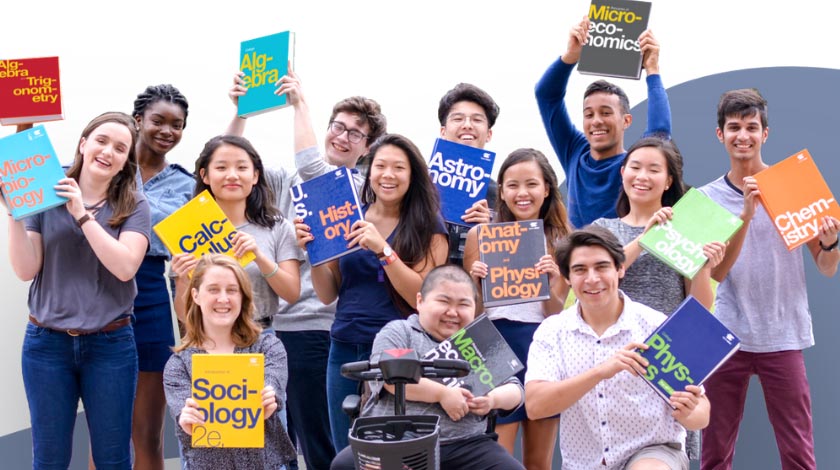Photo credit: OpenStax.org
In a Time of Crisis, Students Need Open Educational Resources More Than Ever
The education sector has transformed dramatically over the last month as a result of the COVID-19 crisis. UNESCO estimates that over half of the world’s students are no longer attending in-person schooling due to social distancing guidelines. Here in the Golden State, the entire California Community College system has shifted to online instruction. Not only are students dealing with this abrupt pedagogical change, they are also facing real financial distress from lost wages, unemployment, and a looming pandemic triggered recession. Now more than ever, the educational space needs to step up their support for students and faculty.
The current climate underscores the instructional and financial benefits gained from the use of open educational resources (OER). Creative Commons defines OER as “educational resources (lesson plans, quizzes, syllabi, instructional modules, simulations, etc.) that are freely available for use, reuse, adaptation, and sharing.” OER are often already formatted for easy digital use. The ability to remix openly licensed content allows faculty to tailor learning materials to the specific needs of each course. And perhaps the greatest boon to students is that open educational resources are free.
When faculty members bring OER materials into their real or virtual classroom, they ease the financial burden that their students are forced to shoulder. For a community college student trying to navigate financial insecurity, a free textbook can literally mean the difference between completing a degree or dropping out.
Fortunately, the OER ecosystem is game to meet the current challenges. Our partner at OpenStax, the leading non-profit OER publisher, has seen a surge in usage since shelter-in-place orders went into effect. They report more than 27,000 users including 1,200 new faculty members since mid-March. This uptick is especially remarkable considering it occurred at a time when courses were halfway completed.
OpenStax has an impressive history of positively impacting students’ lives. The organization was already serving 3 million students before the crisis began, and has supported more than 9 million students since its inception in 2012. The free resources have allowed students to pocket over $830 million that they would have spent on instructional materials. And OpenStax’s library of content contains over 35 published textbooks used by 56% of U.S. higher education institutions and in over 120 countries.
In providing assistance during the current crisis, OpenStax has offered free access to it’s adaptive courseware, OpenStax Tutor and Rover, through the end of the semester.
The nonprofit has also deployed Canvas learning management system (LMS) course cartridges built for all of OpenStax resources. These cartridges make it easy for faculty to import a course into their LMS and enable seamless access to resources including test banks and course content. OpenStax is working to rapidly deploy LMS cartridges for Blackboard and D2L platforms as well.
Finally, OpenStax hosted a webinar on the topic of how faculty can make the transition to online education. The webinar is still available for viewing and features advice from experts in online learning and teaching. These specialists include:
- Ira Lovitch, Associate Professor and Director of the Online Bachelor’s Program in the Business Administration Department at Mount Saint Mary’s
- Niki Whiteside, Assistant Vice Chancellor of Instructional Innovation & Support at San Jacinto College
- Sherry Ransdell, Director of Instructional Design Services at San Jacinto College
- Cyrus Helf, Online Multimedia Specialist at West Los Angeles College
The Michelson 20MM Foundation is proud to partner with OpenStax and promote their services during this time of crisis. Michelson OER Fellow, Dr. Barbara Illowsky, also hosted a webinar for those new to online teaching where she reviewed how to use both Canvas and Blackboard OpenStax course cartridges for all of the college level OpenStax texts. These course cartridges were developed based on guidelines that faculty created via the California Community College’s Online Education Initiative. You can view that webinar here.
The Michelson 20MM Foundation and its initiatives are made possible by the generous support of Gary K. Michelson, M.D. and his wife, Alya Michelson. To learn more about open educational resources and how they can assist faculty and benefit students please sign up for notifications using the form below.

